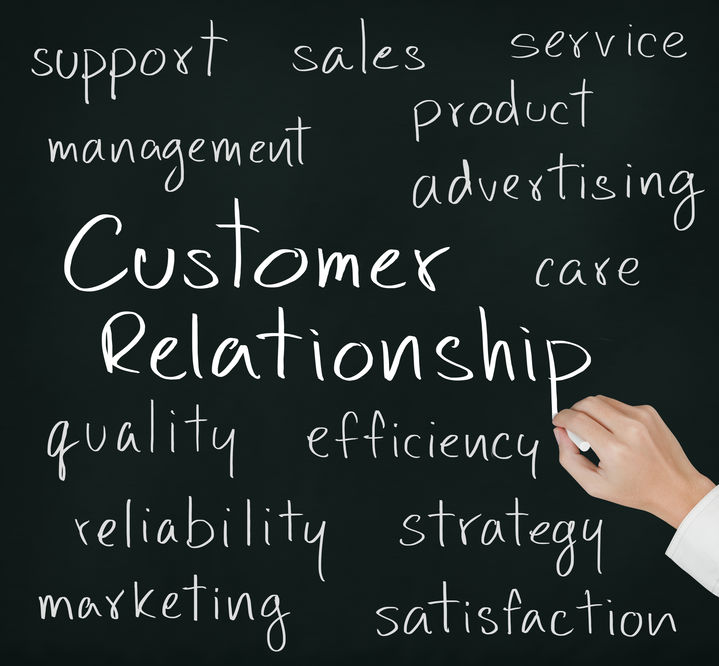
The Essential Work of Talking to Your Customers
April 27, 2020
Customer Experience Firms Announce Partnership
June 9, 2020Expert Conversations – CX Evangelist Debbie Szumylo of Thomson Reuters
Debbie Szumylo is a Customer Experience Evangelist at Thomson Reuters in Eagan, MN, and if you spend any time at all with her you’ll know the evangelist label is an apt one. Debbie has been about the business of customer experience (CX) for 17 years and specializes in helping organizations balance employee engagement, customer experience and business results. She’s a tireless champion for improving the customer experience, and we immediately knew she would provide insight into the current (and changing!) CX landscape. E.G.’s Alyssa Tuma and Eric Engwall sat down with Debbie earlier this year to talk about her path to the CX discipline and some of the joys and challenges she’s had along the way. To follow Debbie, you can find her on Twitter at @DebbieSzumylo.
E.G. Insight: CX is a relatively new discipline, so how did you get to where you are?
Debbie Szumylo: For me, it was kind of an accident, actually. I was working in marketing at a large local company, and an opportunity came up with a new team.
We were in a business where the product we were selling was losing share year over year, and we knew there was an end in sight. We had to do something to reengage our customers. So we went to the CEOs and asked them, “What are the things that keep you up at night?”
One of the things they said was that they really worried about how to retain and keep customers, and that customer satisfaction was a big issue. We decided to take it a step further and focus on customer experience.
We developed a turnkey program where we educated our clients on how to create an experience for the end consumer. And that program included mostly education. We worked with Lou Carbone, 15 years ago, he was the pioneer of customer experience. We started focusing on basics, like the five senses. For example, when a customer walks in the door, do they notice the way things smell? Is your garbage in the lobby overflowing? How does that impact the experience they have with you? It was just really basic things.
After a couple of years we decided we could take this a step further, and we developed our own methodology, and we sponsored conferences that were focused on designing the experience our customers would have when they came to the event —from the minute they booked their ticket with us, to the minute they left, and even beyond that. Every single thing was designed intentionally, there wasn’t anything that was overlooked.
We also had groups we called “collaboratives,” where each year we would invite clients to participate. We would spend the year working on an industry issue and try to solve it as group side by side. We’d pull out the red carpet for this group, treat them incredibly well, and in turn they would mention us at every conference they were at, they would speak on our behalf, etc. They became our “angel network.”
So that’s how I started! It was a complete accident. So it was awesome. It was scary as heck because we just did stuff! And nobody said ‘don’t,’ and so we just did. We had very little money, we had very few resources, so we just did everything ourselves. It was baptism by fire all the time, and it was cool.
What were your measures of success?
DS: We were able to prove retention. We were able to prove that those that attended our conferences and those that participated bought our product and participated in all of the different things that we were offering. Our retention rate was like 98.8%. And they were beating down the door to participate in our collaborative. I think we did five different rounds, and we had to turn people away who wanted to participate in those. The word of mouth they would take to different conferences, and the times we’d show up in different association publications because our clients were talking about us – those were our measurements of success.
E.G.: They became evangelists. And that is worth its weight in gold. And it’s hard to measure the impact of that, but you’d be foolish not to know that it helps.
DS: And they [the clients] wanted to do more. They wanted to help us test product and help us with next steps. “We’ve solved this problem, or we’ve at least attempted to solve this problem, now what? What’s the next thing? Give me more, give me more…”
E.G.: It wasn’t about your core business; it was about all the other things, all the other ways that they were benefiting. That’s what had them coming back over and over.
DS: Right. It was nirvana. And how many times can you get that? It’s so hard to attain.
So, that’s how you got started. Knowing now that this was what you were going to do, was there anything that you would have done differently to prepare yourself?
DS: Yes. So, my background is in communications and human relations, so I think I’ve got a good, solid background in that. One thing I’m not as good at when it comes to this stuff is the analytic piece of it. I wish that I knew more about that. I wish my brain worked that way; it just doesn’t naturally work that way.
I wish this [CX] would have been “a thing,” and I wish I would have known what classes and things I could have taken to supplement this in a different way. And I know that it’s still not even really “a thing,” I think there’s like one college that has this type of program.
Whether in your current role or previous ones, what are some unexpected challenges that you’ve encountered? What barriers did you run into that you just didn’t anticipate?
DS: I think that the biggest one – and I still feel this – is sometimes really feeling like an island. In the beginning that was definitely the case because it [CX] was so new. I still oftentimes experience that.
One of the biggest frustrations about this role, and one of the barriers right now, is battling the terminology and the trendiness of “customer experience.” There’s a wave right now [for CX] and people are trying to grab onto it and ride it, despite the fact that they don’t understand it. So for somebody that “gets it” and has been practicing it, it’s really frustrating.
I used to do corporate meeting planning, and I would go to visit the hotels before bringing clients there. The whole intent of me going was “I’m creating an experience for my clients.” So I wanted to be completely in tune with those hotels and I wanted them to be an extension of what I was bringing. And I would tour, and I would look for specific things. Inevitably, one of the managers would flash me their customer satisfaction award and tell me all about, “This is our customer satisfaction award, we’re 9 out of 10, and blah, blah, blah…”
And I’d say, “That’s great, but I’m not that interested in a customer satisfaction award. That means something completely different than what I’m looking for.” And they would continue to drone on and on and on about their customer satisfaction award, not understanding that we’re on two completely different pages here. It’s one of the most frustrating conversations to have.
E.G.: We’ve been around long enough that we’ve seen management trends and “flavor of the month” issues that get popular in corporate environments, As part of that popularity, these things get dumbed down, right? It gets co-opted and then it doesn’t mean anything anymore. One of the things that I’m seeing is that there seems to be this movement towards saying that customer experience is the property or the purview of the call center. Well… no. Call centers make up one small piece of the overall experience your customer has with your organization. If you label CX as being the responsibility of the call center, then you’re going to fail. So I agree with you – the trendiness, it waters it down.
DS: Right. Everybody wants in, but most don’t know what they’re getting into.
E.G.: Right, so both internally, and externally as a service provider, you have to define CX and you have to defend your definition and evangelize for it, but you also have to do it in a way that people understand.
That whole “feeling like an island” challenge – how has that gotten better?
DS: Well, there weren’t the networking opportunities there are now. #CXChat on Twitter is invaluable to me, organizations like CXPA, just the fact that I’m on Twitter all the time – I have to be, that’s kind of like my sanity – I’m reading, absorbing as much as I can. I don’t use the CXPA chapter as much as I could. But all those resources are at arm’s length. That has helped a great deal.
That, and I’m fortunate in that I have a boss that understands [CX]. I have a company now that supports it. Previously, there was no money, there were no resources, and leadership did not get it – but now it’s supposed to be part of our core culture. Even though I feel like we still struggle with that, at least I feel like I can build a case and I can ask for money and resources and probably get it because it is part of our culture.
What are you seeing in the CX world that you’re excited or intrigued by?
DS: One thing I’m intrigued by, but I’m not quite sure how I feel about it, is the whole marriage of marketing and CX. That burned me before, so I’m not quite sure how I feel about it, I have a personal concern, BUT I get it…
I’ve never seen them [marketing and CX] work that great together before, so I’m curious to see what will happen there. I know there’s a lot of talk about, “Does CX belong in marketing? Does CX lead marketing? Does marketing lead CX?” I don’t know. Should they be working together? For sure, but how do you do that well?
I just say, “I keep our customers happy.” I don’t know how else to explain my job. I work really hard at keeping our customers happy.
E.G.: Which isn’t marketing.
DS: Exactly. So that’s one thing that I always think about – when’s this all going to happen? I see headlines that say, “CX will be the future,” or “CX will be the trend of 2020” – I mean, how many years have we been seeing that? Like, really? Wasn’t that just the trend last year? Or ten years ago? So when is it going to BE?
How do you be an evangelist inside of your organization?
DS: Well, I have to cast the right shadow. I have to walk the talk. I do a lot of sharing of information – I try not to do too much, because then I’m shoving it down their throats.If I find something really good that I’ve read, I will share it. I will not just share it to share. I will relate it to something we’ve recently talked about or some experience that we’ve had.
I am constantly trying to get people to look at things a little bit differently. I also get the opportunity to speak about different topics related to CX at meetings and events.
We just recently did Adam Toporek’s training – he’s one of the industry experts on customer experience – and our entire Legal Services Department just went through his “7 Service Triggers” training, and it’s all about the things that trigger your customers and make them unhappy. I got all of our associates trained on that, there’s like 400 of them. And now I’m working backwards to relate the “7 Service Triggers” to actual things that we do, and continuing to feed that to them. So just trying to plug in little snippets of information.
Let’s go negative for just a bit. What are the biggest mistakes organizations are making? Or CX leaders?
DS: Wanting everything done tomorrow. They think that this can happen yesterday. And it is not a quick fix. It is a commitment, and it’s going to take resources, and it’s going to take time – and sometimes it’s going to take a LOT of time.
That’s one of the things I see: People don’t get that this is a journey. And another thing: companies forget that in order to have a successful customer experience you have to have a successful employee experience. I fully believe that employee experience has to come first, and a lot of companies do it backwards. It’s going to delay success and cause frustration.
Before your customers can love your company, your employees have to love your company.
Another mistake? The thought that only one area is responsible for customer experience. Everybody touches it. Even if you’re the IT guy that sits in the back room with your sunglasses on, you still affect the customer in some way.
E.G.: Yeah, ultimately it’s not a function, it’s not a department, it’s not an activity – it’s a culture, and it’s how we do things, if you’re really serious about it. Not to say you can’t get some benefits from programmatic solutions, but that’s just what they are is programs. And programs come and go. And cultures survive. And in some cases companies become legendary for their focus on customers and employees, and it becomes part of the brand. And I think that’s what people miss – it’s not a program that you implement, it’s a way of being an organization.
Of the things you’ve done in your CX related work, what are you most proud of?
DS: Probably knowing what I know about the loneliness of CX work and the risks and the unknowns, just jumping in and finding something that I absolutely love. And I could just sit here and talk about [CX] forever. And finding my passion. And that’s sort of a rare thing. Finding something – whether it was by accident or not – finding something and making it work.
Now that I know all the pitfalls of this work, despite all that, it just makes me incredibly happy, and I love talking about it and I love telling people about it and I love especially telling the nonbelievers and trying to inspire nonbelievers. I’m just proud that I’ve had the good fortune to do this. Even though I can’t explain what I do, I make customers happy!
Photo Credit: Ian Schneider on Unsplash




